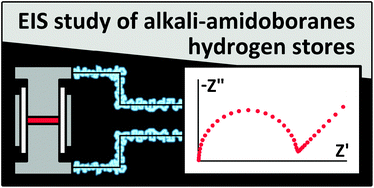Insights from impedance spectroscopy into the mechanism of thermal decomposition of M(NH2BH3), M = H, Li, Na, Li0.5Na0.5, hydrogen stores†‡
Abstract
We report the first solid-state impedance study of hydrogen-rich ammonia borane, AB, and its three alkali metal amidoborane derivatives. Temperature-dependent impedance spectra of solid M(NH2BH3) salts are predominated by ionic conductivity, which at room temperature ranges from 5.5 μS cm−1 (M = Li) to 2.2–3.0 mS cm−1 (Na, Na0.5Li0.5), while the activation energy for conductivity is rather high (140–158 kJ mol−1). Variation of conductivity with time can be used to extract information about the evolution of the system during thermal decomposition. By using a combination of impedance spectroscopy, thermogravimetric analysis, scanning calorimetry, evolved gas analysis, infrared absorption spectroscopy as well as 11B and 1H MAS NMR, we were able to reconfirm the complex pathway of thermal decomposition of amidoboranes postulated by two of us earlier (J. Mater. Chem. 2009, 19, 2043).


 Please wait while we load your content...
Please wait while we load your content...